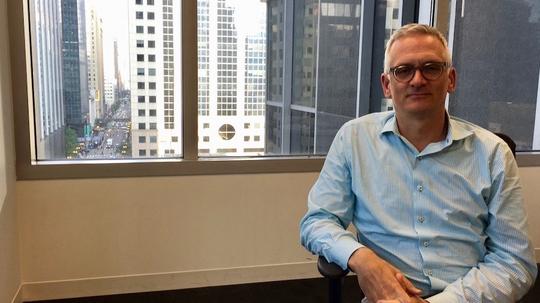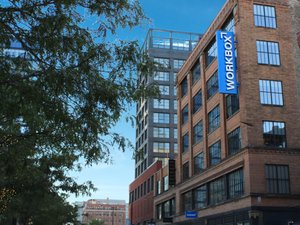
Big Data has become such a tech buzz word in recent years that it gets thrown around without even really thinking about it. So let’s give it some perspective.
Start with a trillion rows of data: If you were to print out one trillion rows of data, at one hundred rows per page, it would circle the world 73 times. If a human tried to read that data, looking at 50 rows per second, it would take about 600 years to get through it.
That’s the amount of data Chris Gladwin’s new startup Ocient wants to analyze, and they’re building technology to read and understand data that’s so big, it doesn’t even exist yet.
“There’s only certain ways today you can make that much data,” said Gladwin, sitting at his desk on the eighth floor of his downtown Chicago office. “There are some places that have this problem right now. No doubt about it. But there will be an accelerating amount of places that’ll have this problem in the future.”
The amount of data the world produces is increasing rapidly, each piece of new technology making more data than the one before it. Businesses are going to need a way to analyze the massive amount of data they have, and make sense of the information they’re collecting. That’s where Ocient comes in.
“We’re doing real innovation. It’s going to take a lot of really smart people a really long time to figure it out”
“Name a new plane or a new phone that makes less data than the old one did,” Gladwin said. “Generally speaking, new technology makes more data. There’s a need to analyze that.”
How exactly does Ocient plan to do that? Gladwin won’t say. Nor will he say if Ocient has customers, or who potential customers could be. But they’re out there, Gladwin says, and there will be many more in years to come.
Cleversafe
It’s safe to say Gladwin isn’t in a hurry to land customers. At Cleversafe, his previous company, the business didn’t generate revenue until year six. Cleversafe, which launched in 2004, built revolutionary technology around data storage, raised around $100 million and was sold to IBM in 2015 for $1.3 billion.
It was one of the biggest tech exits ever in Chicago, and minted 80 new millionaires based on the equity structure Gladwin set up. It’s regarded as one of the most influential exits the Chicago tech ecosystem has seen in recent memory.
That deal has helped Gladwin self fund Ocient to this point. He won’t say if and when he plans to take on outside capital, but not having to run around for funding has allowed him to focus more on the business and less on fundraising, he said.
The genesis for Ocient began while Gladwin was in the thick of things at Cleversafe. Customers who have data storage challenges typically also have data analysis needs, he said. But the idea really began to take shape about six months before the IBM deal. He stayed on with IBM for three months, his agreed upon time with the company, then began building Ocient.
I couldn’t help but wonder, after a billion dollar plus exit, why Gladwin didn’t want to wait a few years before jumping right back into the game. Take it easy for awhile. Travel the world. Enjoy all the benefits that come with selling your company to IBM.
“The idea and the opportunity was there. And it was time to roll.”
He did some of that, he says. He volunteered on a research expedition studying sea turtles in the Bahamas. He toured Bletchley Park, the site for British codebreakers during World War II. He went to a Cubs World Series game.
But not building, not innovating, wasn’t really an option for Gladwin.
“It’s what I do,” he said. “I’ve done this my whole life. I think I get better at it each time I go through it.”
“The idea and the opportunity was there,” he added. “And it was time to roll.”
Surviving the Dot Com Bubble
Gladwin’s career in entrepreneurship goes back to 1996 when he founded Cruise Technologies, a wireless tablet computer company.
Then, in 1999, he founded MusicNow, a Chicago-based music licensing startup that sold music rights to big companies like Microsoft and Best Buy, who would sell the online music to consumers. MusicNow secured many of the first licenses in the industry from big music companies like Sony, BMG and Universal.
MusicNow was a pioneer in the digital music space. Launched a full five years before iTunes, MusicNow was the the first company to license music for digital distribution, and it created the metadata standard for a song (i.e. what is the field name of publisher? What's the schema for what song goes on what track?) that is still used by digital music companies today.
The company, which raised $42 million, eventually sold to Circuit City in 2004. It wasn't a great exit, Gladwin admits, as the sale price was less than the amount MusicNow had raised. But this was just after the tech bubble had burst, and MusicNow's investors had run out of money, and the business needed outside capital to keep scaling. MusicNow had no choice but to sell. But any sale at all was better than the fate many tech entrepreneurs faced after the crash. Gladwin said even though MusicNow was the dominate player in the space, growing top line revenue 15% month to month, fundraising was nearly impossible to come by.
"We had to sell it at the worst possible time," Gladwin said.
A Career of Big Swings
From tablets, to digital music, to data storage, Gladwin has made a career out of disrupting industries and predicting what technology will be important in the future. Cruise was 15 years ahead of the iPad. MusicNow was half a decade before iTunes. Cleversafe was years ahead of the demand for cloud storage, and Ocient is headed down a similar path with data analysis.
It's still too early to tell if Ocient can change business the way his previous companies have, but Gladwin is betting on it. The startup has 15,500 square feet and around 30 employees at 100 N. Riverside Plaza, and room to add about 70 more. The team is full of former employees who've worked with Gladwin at his various companies, and he's plucked other engineers from places like IBM and Square.
And unlike Chicago entrepreneurs who hit it big and left, Gladwin said he remains committed to Chicago due in large part to the talent he's been able to find.
"We’re doing real innovation. It's going to take a lot of really smart people a really long time to figure it out," he said. "The talent level you can get out of local and regional universities is as good as it gets."








